Related Research Articles
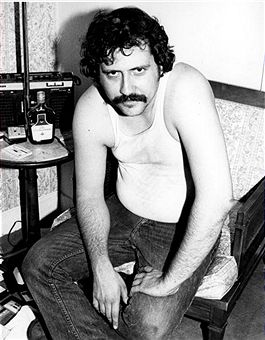
Leslie Conway "Lester" Bangs was an American music journalist, critic, author, and musician. He wrote for Creem and Rolling Stone magazines, and was known for his leading influence in rock music criticism. The music critic Jim DeRogatis called him "America's greatest rock critic".
Punk rock is a music genre that emerged in the mid-1970s. Rooted in 1960s garage rock, punk bands rejected the perceived excesses of mainstream 1970s rock music. They typically produced short, fast-paced songs with hard-edged melodies and singing styles, stripped-down instrumentation, and often shouted political, anti-establishment lyrics. Punk embraces a DIY ethic; many bands self-produce recordings and distribute them through independent record labels.
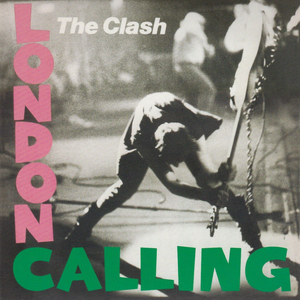
London Calling is the third studio album by English rock band the Clash. It was originally released as a double album in the United Kingdom on 14 December 1979 by CBS Records, and in the United States in January 1980 by Epic Records.

Music from Big Pink is the debut studio album by the Band. Released in 1968, it employs a distinctive blend of country, rock, folk, classical, R&B, blues, and soul. The music was composed partly in "Big Pink", a house shared by bassist/singer Rick Danko, pianist/singer Richard Manuel and organist Garth Hudson in West Saugerties, New York. The album itself was recorded in studios in New York and Los Angeles in 1968, and followed the band's backing of Bob Dylan on his 1966 tour and time spent together in upstate New York recording material that was officially released in 1975 as The Basement Tapes, also with Dylan. The cover artwork is a painting by Dylan.
Digital hardcore is a fusion genre that combines hardcore punk with electronic dance music genres such as breakbeat, techno, and drum and bass while also drawing on heavy metal and noise music. It typically features fast tempos and aggressive sound samples. The style was pioneered by Alec Empire of the German band Atari Teenage Riot during the early 1990s, and often has sociological or far-left lyrical themes.

Substance is a compilation album by English alternative dance band New Order. It was released in August 1987 by Factory Records. The album compiles all of the band's singles at that point in their 12-inch versions, along with their respective B-side tracks. The then-newly released non-album single "True Faith" is also featured, along with its B-side "1963" and new versions of "Temptation" and "Confusion".
The Beatles at the Hollywood Bowl is a live album by the Beatles, released in May 1977, featuring songs compiled from three performances recorded at the Hollywood Bowl in August 1964 and August 1965. The album was released by Capitol Records in the United States and Canada and on the Parlophone label in the United Kingdom. It was the band's first official live recording. A remixed, remastered, and expanded version of the album, retitled Live at the Hollywood Bowl, was released on 9 September 2016, on CD for the first time, to coincide with the release of the documentary film The Beatles: Eight Days a Week, directed by Ron Howard.

The Von Bondies are an American rock band formed in 1997. The band's breakthrough album, Pawn Shoppe Heart, was released in 2004 and features the singles "C'mon C'mon" and "Tell Me What You See".

A bootleg recording is an audio or video recording of a performance not officially released by the artist or under other legal authority. Making and distributing such recordings is known as bootlegging. Recordings may be copied and traded among fans without financial exchange, but some bootleggers have sold recordings for profit, sometimes by adding professional-quality sound engineering and packaging to the raw material. Bootlegs usually consist of unreleased studio recordings, live performances or interviews without the quality control of official releases.
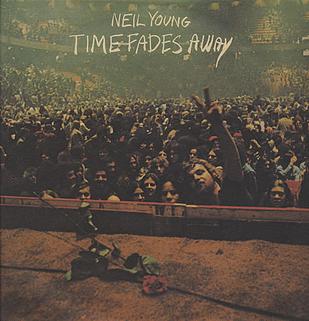
Time Fades Away is a 1973 live album by Canadian-American musician Neil Young. Consisting of previously unreleased material, it was recorded with the Stray Gators on the support tour following 1972's highly successful album Harvest. Due to Young's dissatisfaction with the tour, it was omitted from his catalogue and not released on compact disc until 2017. The album is the first of the so-called "Ditch Trilogy" of albums that Young recorded following the major success of Harvest, whereupon the scope of his success and acclaim became so apparent that Young subsequently experienced alienation from his music and career.
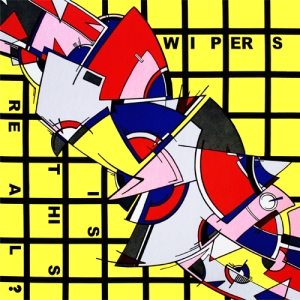
Is This Real? is the debut studio album by the Portland, Oregon-based punk rock band Wipers, originally released on vinyl in January 1980 by Park Avenue Records.

Bad Brains is the debut studio album recorded by American hardcore punk/reggae band Bad Brains. Recorded in 1981 and released on the cassette-only label ROIR on February 5, 1982, many fans refer to it as "The Yellow Tape" because of its yellow packaging, much in the way that the Beatles' self-titled record is often called "The White Album". Though Bad Brains had recorded the 16 song Black Dots album in 1979 and the 5-song Omega Sessions EP in 1980, the ROIR cassette was the band's first release of anything longer than a single.

Crime was an early American punk band from San Francisco, California, United States. The band was formed in 1976 by Johnny Strike, Frankie Fix, Ron "The Ripper" Greco, and Ricky Tractor (drums). Their debut, the self-financed double A-side, "Hot Wire My Heart" and "Baby You're So Repulsive", appeared at the end of 1976, and is the first single released by a U.S. punk act from the West Coast.

Fucked Up is a Canadian hardcore punk band from Toronto, Ontario, formed in 2001. The band consists of guitarists Mike Haliechuk and Josh Zucker, bassist Sandy Miranda, lead vocalist Damian Abraham and drummer Jonah Falco. From 2007 to 2021, the band also included guitarist and vocalist Ben Cook.
Mike Stone is an American guitarist, best known for his involvement in the progressive metal band Queensrÿche. He joined Queensrÿche for their 2003 Tribe tour, and made his first appearance on the 2003 album Tribe, with writing credits for the song "Losing Myself". He parted ways with the band in 2009, but rejoined initially in 2018 as a touring guitarist for then guitarist Parker Lundgren, and full-time in 2021. Stone was the guitarist for the rock band Speed-X, and currently the guitarist and backup vocalist of the alternative punk rock band, The Stick People.
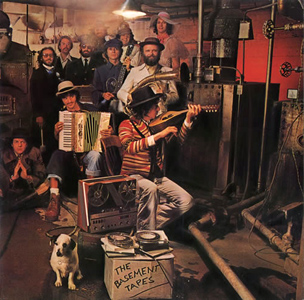
The Basement Tapes is the sixteenth album by American singer-songwriter Bob Dylan and his second with the Band. It was released on June 26, 1975, by Columbia Records. Two-thirds of the album's 24 tracks feature Dylan on lead vocals backed by the Band, and were recorded in 1967, eight years before the album's release, in the lapse between the recording and subsequent release of Blonde on Blonde and John Wesley Harding, during sessions that began at Dylan's house in Woodstock, New York, then moved to the basement of Big Pink. While most of these had appeared on bootleg albums, The Basement Tapes marked their first official release. The remaining eight songs, all previously unavailable, feature the Band without Dylan and were recorded between 1967 and 1975.

David Ferguson was an American international outsider-culture impresario, activist, music producer and concert promoter. Over his career, most of which has been spent on the West Coast, he worked with musical acts such as the Avengers, John Lydon, Billy Bragg, Iggy Pop, Bad Brains, Black Flag, and Butthole Surfers and visual artists Vaughn Bode, Jean-Michel Basquiat, and Barry McGee. Ferguson worked with multi-discipline artists such as avant-garde musician and spoken-word artist Lydia Lunch and the psychedelic drag queen performance group the Cockettes.
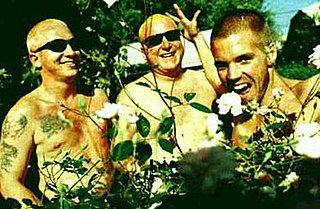
Sublime was an American rock band from Long Beach, California, formed in 1988. The band's line-up, consistent throughout its duration, consisted of Bradley Nowell, Eric Wilson (bass), and Bud Gaugh (drums). Lou Dog, Nowell's dalmatian, was the mascot of the band. Nowell died of a heroin overdose in 1996, resulting in the band's breakup. In 1997, songs such as "What I Got", "Santeria", "Wrong Way", "Doin' Time", and "April 29, 1992 (Miami)" were released to U.S. radio.
The Dancing Cigarettes were a popular post-punk and art band based in Bloomington, Indiana, active from 1979 through 1983. They were part of a cadre of Bloomington-based bands that made an impact on the underground music scene. Other bands included The Gizmos, Zero Boys, Dow Jones and the Industrials, and MX-80 Sound. These bands established Indiana as an innovative breeding ground for punk, post-punk and new wave music in the late 1970s and early 1980s.

Many recordings and performances by the Beach Boys have attained some level of public circulation without being available as a legal release, and several albums by the band or its individual members were fully assembled or near completion before being shelved, rejected, or revised as an entirely new project. Since the early 1980s, numerous rarities compilations and album reissues have been released with studio outtakes included as bonus tracks.
References
- ↑ "John Creighton". Discogs .
- ↑ "The To Do List". NYMag.com. New York Magazine. 9 July 2014. Retrieved 2016-02-07.
- ↑ "First Listen: "Instant" From Stick Against Stone's The Oregon Bootleg Tapes". Vibe. 16 May 2014. Retrieved 2016-02-07.
- ↑ Gale, Ezra. "Wax Poetics #60". Archived from the original on 2017-07-03. Retrieved 2020-01-16.
- ↑ Christgau, Robert (2014-10-24). "Robert Christgau:Expert Witness: Baseball Project / Hamell on Trial / Richmond Fontaine / Delines /Stick Against Stone /Ry Cooder /Modern Baseball, (Yep Roc), (New West), (El Cortez '02)". Medium. Archived from the original on 2016-03-04. Retrieved 2016-02-07.
- 1 2 "Stick Against Stone: The Oregon Bootleg Tapes". Pitchfork. Retrieved 2016-02-07.